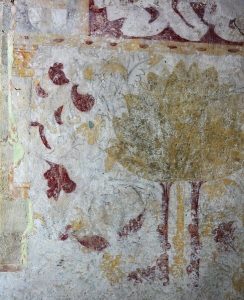
Detail of wall painting at Ellys Manor House
Thank you to Clive Taylor of Ellys Manor House for this guest article. Please do consider signing one of the petitions to help Clive and Ellys Manor House.
Ellys Manor House (pronounced Ellis, affectionately referred to as EMH), is without doubt one of the United Kingdom’s most significant historic buildings. Historic notes credit Anthony Ellys, a rich English wool merchant of the Staple of Calais, as builder of the house and the adjacent church tower in the late medieval/early Tudor period.
The architectural language of this unique and magical building fully encapsulates Early Modern European, British and Hanseatic League history, a testament to the Northern Renaissance. Yet today, the building goes unnoticed, even by some scholars.
Cheapside, in London (said to be our first high street) - one could see these Crow stepped gable buildings with their lookout towers along the street. And not far away, in Cannon street, was located the German Steelyard (from the Middle Low German) Stalhof; this was the trading base for the Hanseatic League in London during 15th and 16th centuries. Sadly, after The Great Fire of London (1666), they are no more. That is not to say that today one will not see buildings aping that style of architecture. However, to have ancient Ellys Manor House surviving, approximately 105 miles north of London, 4 miles south of the historic market town of Grantham in Lincolnshire (one would not know it today, but Grantham was a very important wool town), is a real treasure. When it comes to history, one cannot beat having the structure where it was first conceived and created, because then, and only then, the whole of the topography will relate.
However, the highlight of the building is the early sixteenth century wall paintings on the upper floor, described by architectural historian Sir Nikolaus Pevsner as, “a rare English interpretation of French verdure tapestries.” The paintings, dated around 1500, are said to be, “the most complete, extensive and important domestic decoration of this date in the country.”
Up at Ellys Manor House, our aim is to use this fascinating building to create the Ellys Manor House Culture Centre (internationally renowned), to educate and inspire in the art of recognition. It is imperative we maintain a forensic quality to our research. I know of no finer building on our shores to be used as this platform.
To perambulate northern Europe, especially the Baltic region, one will find oneself immersed in this style of architecture, thus also reflecting our shared commonality.
To our American friends, you too can claim commonality, with the absolutely fabulous historic St Luke’s Church amid stately oaks of Smithfield Virginia. This splendid building was founded in 1632. I do believe this to be the earliest in the Americas, however, if anybody knows of an earlier example in the Americas, please do let us know.
Sadly, Ellys Manor House is presently closed to the public; this is due to matters arising with our Local Council. However, we do hope that matters will be resolved speedily. Until then, we do have a live petition at Parliament: https://petition.parliament.uk/petitions/226444 which only United Kingdom residents are permitted to sign. However, there is a second petition at: https://www.change.org/p/defending-our-heritage which everybody can sign, and we hope you will, as you signing will help us to achieve our aims. It is imperative we protect our historic environment.



Done. (Not a resident, signed the petition.)
Thank you, Michelle, that’s much appreciated.